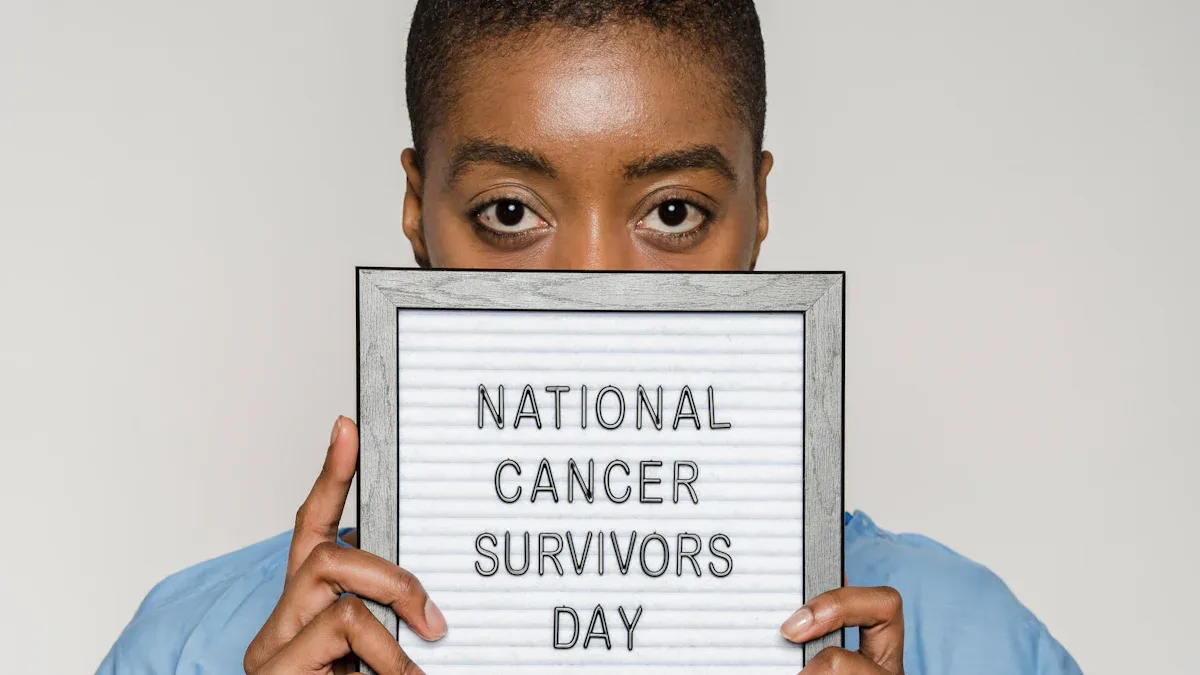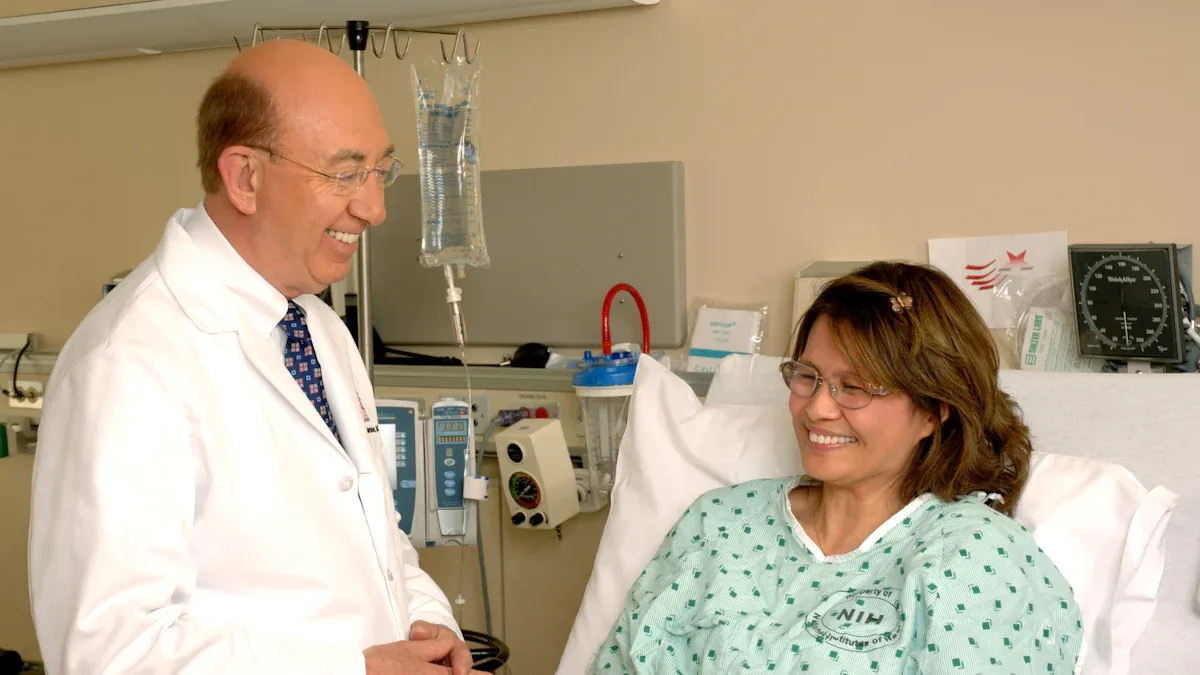Real Stories of Cancer Patients Thriving with Targeted Therapy

Targeted therapy has revolutionized cancer treatment, offering a beacon of hope to patients worldwide. Unlike traditional methods, this approach tailors treatment to the unique genetic makeup of each tumor, leading to remarkable outcomes. Studies show that patients with therapies matched to their genomic alterations experience significantly longer survival rates. For example:
High matching scores between therapies and genomic profiles improve overall survival.
Combination therapies targeting multiple alterations enhance outcomes, even in challenging cases like pancreatic cancer.
These advancements prove that precision medicine can transform lives. Real stories of triumph, like those in "Targeted Therapy Success Stories: Patients Speak Out," inspire optimism and demonstrate the power of innovation in cancer care.
Key Takeaways
Targeted therapy matches cancer treatment to the tumor's unique genes.
This can lead to better results and longer survival times.
Patients like Ginger and Lindsay show these therapies improve life.
They can do daily activities while still managing their cancer.
New treatments like CAR T-cell therapy and EGFR inhibitors give hope.
These precision medicines can change lives in amazing ways.
Research and trials are needed to make targeted therapies better.
This helps more people get care made just for their cancer.
Knowing your cancer's genes can help find the right treatment.
Talk to your doctor about testing options to learn more.
Targeted Therapy Success Stories: Patients Speak Out

Ginger’s Journey: Overcoming Lung Cancer
Diagnosis and the start of her clinical trial
When Ginger received her lung cancer diagnosis, she felt overwhelmed. Her doctors discovered that her cancer had spread to her brain, making her case more complex. However, she didn’t lose hope. She joined a clinical trial that matched her tumor’s genetic profile with a targeted therapy. This decision changed her life. The trial was part of groundbreaking research, such as the ALCHEMIST Trial, which tests targeted therapies based on tumor genetics. These studies have shown that matching therapies to genetic alterations can lead to better outcomes compared to traditional chemotherapy.
Shrinking brain metastases and improved quality of life
Ginger’s treatment began to work quickly. Her brain metastases started shrinking, and her symptoms improved. She regained her energy and could enjoy her daily activities again. Studies like the 2023 Clinical Trial have shown that targeted therapies, such as selpercatinib, offer longer progression-free survival compared to chemotherapy. Ginger’s story is a testament to how targeted therapy can transform lives, offering not just extended survival but also a better quality of life.
Lindsay’s Story: Living Beyond Expectations
Surpassing the median survival rate with EGFR inhibitors
Lindsay’s diagnosis of advanced lung cancer came with grim statistics. Yet, she defied the odds. Her doctors prescribed osimertinib, an EGFR inhibitor known for its effectiveness in treating EGFR-mutated lung cancer. Clinical trials have demonstrated that osimertinib extends progression-free survival and improves overall outcomes. Lindsay’s treatment helped her surpass the median survival rate, proving that targeted therapies can rewrite expectations.
Thriving for seven years with minimal side effects
Seven years later, Lindsay continues to thrive. Her treatment has kept her cancer stable with minimal side effects. Patients like Lindsay report improved quality of life, as seen in cases where EGFR inhibitors like afatinib provide long-term disease management. Her journey highlights the potential of targeted therapy to offer not just survival but a fulfilling life.
Tori Lee’s Life-Saving Treatment
CAR T-cell therapy and its impact
Tori Lee faced a life-threatening diagnosis of B-cell malignancy. Her doctors recommended CAR T-cell therapy, a cutting-edge treatment that uses genetically modified immune cells to attack cancer. Long-term follow-up data show that CD19-targeted CAR T cells can lead to prolonged remissions with minimal toxicities. For Tori, this therapy was a lifeline, offering hope when other treatments had failed.
Confidence in long-term effectiveness
Today, Tori feels optimistic about her future. CAR T-cell therapy has given her a new lease on life. While some remissions may be shorter-lived, many patients experience lasting benefits. Tori’s story underscores the importance of continued innovation in targeted therapies, which are saving lives and inspiring confidence in long-term outcomes.
Stories of Triumph Over Breast Cancer
Lisa’s Experience: Avoiding Chemotherapy
Receiving ER positive breast cancer treatment
When you hear the word "cancer," it can feel like the world stops. Lisa felt the same when she was diagnosed with ER-positive breast cancer. Her doctors explained that her tumor was fueled by estrogen, but they also had good news. Instead of chemotherapy, Lisa could receive targeted therapy designed specifically for her type of cancer. This treatment focused on blocking the hormones that fed her tumor. With this approach, Lisa avoided the harsh side effects of chemotherapy and began her journey toward recovery.
The role of targeted therapy in her recovery
Lisa’s targeted therapy worked wonders. Her tumor shrank steadily, and her energy levels improved. She could spend more time with her family and return to her favorite hobbies. Targeted therapies for ER-positive breast cancer, like CDK4/6 inhibitors, have shown remarkable success in clinical studies. Lisa’s story is a shining example of how these treatments can transform lives. You, too, can find hope in these advancements, knowing that cancer care is becoming more personalized and effective every day.
Sabrina’s Fight Against Metastatic Breast Cancer
Starting Herceptin and Perjeta therapy
Sabrina’s diagnosis of metastatic breast cancer came as a shock. The cancer had spread beyond her breast, making treatment more challenging. Her doctors recommended a combination of Herceptin and Perjeta, two targeted therapies specifically designed for HER2-positive breast cancer. These drugs work by blocking the HER2 protein, which fuels cancer growth. Sabrina began her treatment with determination, ready to fight for her future.
Demonstrating the effectiveness of these drugs
The results were incredible. Sabrina’s scans showed significant tumor reduction, and her symptoms improved dramatically. She felt stronger and more hopeful with each passing day. Herceptin and Perjeta have been game-changers for many patients, offering longer survival and better quality of life. Sabrina’s journey reminds you that even in the face of advanced cancer, targeted therapies can provide a path to recovery. Stories like hers are at the heart of Targeted Therapy Success Stories: Patients Speak Out, inspiring countless others to believe in the power of innovation.
Precision Medicine in Action: Pancreatic and Melanoma Cases

Steven Merlin’s 12-Year Pancreatic Cancer Survival
Utilizing precision medicine for long-term health
When Steven Merlin was diagnosed with pancreatic cancer, the odds seemed stacked against him. Pancreatic cancer is often detected late, leaving patients with limited treatment options. However, Steven’s doctors turned to precision medicine, tailoring his treatment to the genetic profile of his tumor. This approach gave him a fighting chance.
Studies have shown that patients receiving matched targeted therapy experience significantly better outcomes.
Patients with high matching scores for targeted therapy live longer than those with low scores.
First-line matched therapies improve progression-free survival (PFS) and clinical benefit rates (CBR).
Survival rates for high matching score patients rival those of standard treatments like FOLFIRINOX (median OS of 11.1 months) and nab-paclitaxel plus gemcitabine (median OS of 8.5 months).
Steven’s journey is a testament to these advancements. His treatment not only extended his life but also allowed him to enjoy it fully.
His message of hope for others
Twelve years later, Steven continues to thrive. His story inspires others to explore precision medicine as a viable option. He encourages you to stay hopeful and seek treatments that align with your unique needs. Steven’s experience proves that even in the face of daunting odds, innovation can pave the way for remarkable outcomes.
James’ Journey: Beating Melanoma
The specific therapy used and its results
James faced a melanoma diagnosis that could have been life-threatening. His doctors identified a BRAF mutation in his tumor and prescribed vemurafenib, a targeted therapy designed to attack this specific mutation. This treatment worked wonders, shrinking his tumors and giving him a new lease on life.
Other therapies have also shown promise for melanoma patients:
Tumor-Infiltrating Lymphocyte (TIL) therapy has helped over 30% of patients whose melanoma progressed after anti-PD-1 therapy.
The combination of ipilimumab and nivolumab has set a new standard for treating metastatic melanoma, offering better outcomes than either drug alone.
James’ success highlights the power of targeted therapies to transform lives.
Advocating for early detection and advanced treatments
James now dedicates his time to raising awareness about melanoma. He emphasizes the importance of early detection and encourages you to explore advanced treatments if needed. His journey reminds you that with the right tools and determination, you can overcome even the toughest challenges. James’ story is a beacon of hope for anyone facing a similar battle.
The Broader Impact of Targeted Therapy
Transforming Cancer Treatment
How targeted therapy differs from traditional treatments
Targeted therapy represents a groundbreaking shift in cancer care. Unlike traditional treatments like chemotherapy, which attack both healthy and cancerous cells, targeted therapy focuses on specific genetic mutations driving the cancer. This precision minimizes damage to healthy cells and reduces side effects.
The IMPACT study revealed that patients receiving matched targeted therapy lived significantly longer when their treatment aligned with their molecular alterations. This personalized approach ensures better outcomes compared to one-size-fits-all methods. For example, in advanced pancreatic cancer, combining gemcitabine with the targeted EGFR inhibitor erlotinib showed only minimal improvement in survival when patients weren’t selected based on their genomic profile. This highlights the importance of tailoring treatments to individual needs.
Recent research also emphasizes the transformative role of molecularly targeted therapies in modern cancer protocols. By understanding cancer at a cellular level, scientists are creating safer, more effective treatments that improve survival and quality of life.
The growing list of cancers it can treat
The range of cancers treatable with targeted therapy continues to expand. Recent advancements have introduced therapies for previously untreatable conditions.
Treatment | Cancer Types Treated | Response Rate/Outcome |
|---|---|---|
RET gene fusion cancers (e.g., pancreatic, breast) | 44% response rate | |
Mirvetuximab soravtansine-gynx | FRα positive ovarian cancers | Effective in platinum-resistant cases |
Selpercatinib | Longer progression-free survival than chemotherapy |
These breakthroughs demonstrate the growing potential of targeted therapy to address diverse cancer types effectively.
Stories of Hope and Progress
Common themes from the patient stories
The stories of Ginger, Lindsay, Tori Lee, and others share a common thread: hope. Each patient faced daunting odds but found renewed strength through targeted therapy. These treatments not only extended their lives but also improved their quality of life. You see how personalized care can transform despair into optimism.
The importance of continued research and innovation
Continued research is vital to unlocking the full potential of targeted therapy. Clinical trials, like the 2023 study on selpercatinib for lung cancer, show how innovation leads to better outcomes. Multi-omic testing is also becoming essential for identifying actionable genetic alterations earlier. By supporting advancements in cancer care, you contribute to a future where more patients can thrive.
The stories of Ginger, Lindsay, Tori Lee, Lisa, Sabrina, Steven, and James show how targeted therapy transforms lives. Each journey highlights the power of precision medicine to extend survival and improve quality of life. For example, Ginger’s participation in a clinical trial for BLU-667 helped shrink her brain metastases and stabilize her cancer for over a year, allowing her to live life fully.
Advancements in cancer biology have ushered in a new era of personalized treatments. These therapies target specific genetic mutations, offering more effective and less toxic options. A 2023 clinical trial revealed that patients with RET gene mutations experienced longer progression-free survival with selpercatinib compared to chemotherapy.
Overall Survival Outcome | |
|---|---|
High | Significantly longer |
Low | Shorter |
These breakthroughs bring hope to countless patients. Stay informed about these advancements and seek support if you or a loved one faces cancer. Targeted therapy offers not just treatment but a chance to thrive.
FAQ
1. What is targeted therapy, and how does it work?
Targeted therapy focuses on specific genetic mutations or proteins that drive cancer growth. It blocks these targets, stopping cancer cells while sparing healthy ones. This approach reduces side effects and improves outcomes compared to traditional treatments.
2. Can targeted therapy work for all types of cancer?
Not all cancers respond to targeted therapy. It depends on the genetic makeup of your tumor. Doctors often perform tests to identify actionable mutations. If your cancer has these mutations, targeted therapy could be an option.
3. Are there side effects with targeted therapy?
Yes, but they are often milder than chemotherapy. You might experience fatigue, nausea, or skin changes. Your doctor will monitor you closely to manage any side effects and adjust treatment if needed.
4. How can I find out if targeted therapy is right for me?
Ask your doctor about genetic testing for your tumor. This test identifies mutations that targeted therapies can address. If your cancer matches, you may benefit from this personalized treatment approach.
5. Does insurance cover targeted therapy?
Coverage varies by provider and treatment type. Many insurance plans include targeted therapy, but you should confirm with your provider. Financial assistance programs may also help if coverage is limited.
💡 Tip: Always discuss your options with your healthcare team. They can guide you toward the best treatment plan for your unique situation.
See Also
Choroid Plexus Carcinoma: Key Symptoms and Treatment Options
Conjunctival Melanoma: Recognizing Symptoms and Available Treatments
Duodenal Cancer: Identifying Symptoms and Treatment Strategies

